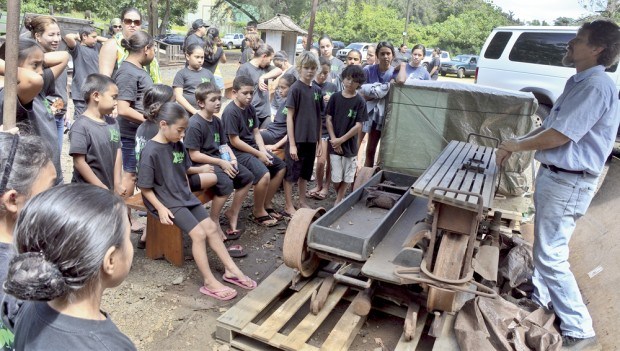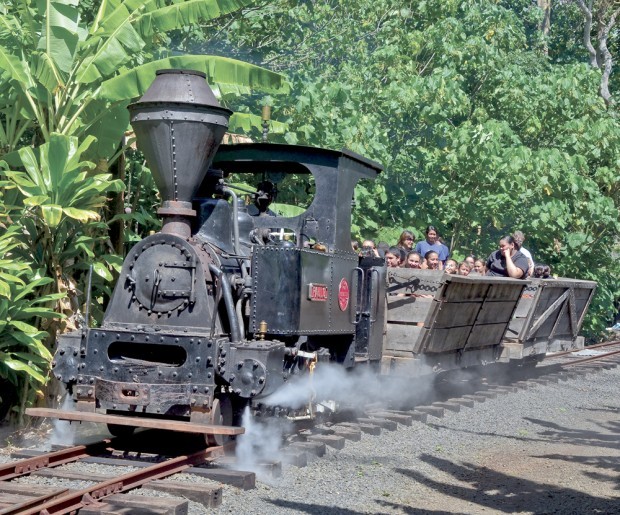LIHU‘E — The unmistakable steam whistle of Paulo, a firewood steam locomotive from the Grove Farm Homesteads Museum, marked the start of a journey into Hawai‘i railroad history for students of Ka Lei Mokihana o Leina‘ala. Hula students participating in
LIHU‘E — The unmistakable steam whistle of Paulo, a firewood steam locomotive from the Grove Farm Homesteads Museum, marked the start of a journey into Hawai‘i railroad history for students of Ka Lei Mokihana o Leina‘ala.
Hula students participating in the annual Queen Lili‘uokalani Keiki Hula Competition on O‘ahu were treated to a hands-on experience to the role railroads played in Hawai‘i’s history.
Kumu hula Leina‘ala Pavao-Jardin said this year marks the third year the Kalaheo-based halau will be participating at the prestigious hula competition on O‘ahu.
This year’s group will consist of 20 girls and eight boys who will take the stage at the 36th Annual Queen Lili‘uokalani Keiki Hula Competition, July 7 through 9 at the Blaisdell Center Arena in Honolulu.
Taelor Sagucio will be the halau’s representative for Miss Keiki Hula and Java Kona will be in the Kane Hula competition.
“One of the numbers they are performing is ‘O Lanakila,’ a song about a steam engine which took Queen Lili‘uokalani around O‘ahu,” Leina‘ala said. “It’s going to be their auana presentation and is a vigorous hula using the uli uli with ti leaf skirts. It’s a fun song and the kids love it.”
Strains of that mele filled the air as the young voices of the hula students took the lead by kumu hula Leina‘ala and mingled the words and hand motions in time with the murmuring of the steam locomotive and the swaying branches of the trees.
Scott Johnson, the Grove Farm Homesteads Museum engineer, said Paulo, the oldest steam locomotive in the state, was scheduled to be taken off line to have work done on its tubes which have become clogged due to normal use.
“A wood-fired power boiler tends to not last as long as in other oil-fired locomotives at Grove Farm,” Johnson said. “But when the hula students asked, we decided we would run Paulo one more time.”
During the tube replacement, Paulo will be moved to the Puhi roundhouse where there is a pit to word under the engine, a nice covering and electricity.
Johnson said work cannot start on Paulo until they come up with funds to cover the costs which at latest estimation, comes to about $5,000.
The boiler tubes which need to be shipped from Pennsylvania accounts for more than $1,100. Labor costs for the two-week process amounts to about $2,000 with an additional $500 for materials related to the replacement job.
Johnson said in addition to those expenses, there is the charge for moving Paulo and the replacement locomotive as well as certification.
He said the last time Paulo had its tubes changed was in 2001 after its supporting role in the move “To End All Wars.”
Carol Lovell, the Grove Farm Homesteads Museum tour coordinator, said several people have already contributed toward having Paulo back on its feet, and the museum will be accepting contributions from people to help with the replacing of the tubes.
Paulo was manufactured at the Hohenzollern Works in Dusseldorf, Germany and shipped to Koloa Sugar Company, the first commercial sugar plantation in the Kingdom of Hawai‘i where it was named after Paul Isenberg, owner of Lihu‘e Plantation and an officer of Koloa Sugar. It was in use until 1920.
Lanakila arrived in Hawai‘i at some point in mid-1890, brought in by B.F. Dillingham. Accompanied by The Pearl, a luxurious car outfitted in rich woods, plush chairs, velvet drapes, electric lights, a kitchen, a lanai with striped canvas awning, and a new-fangled contraption called a flush toilet, states the Kaleinamanu Literary Archive website which discusses chants on the Dillingham O.R.&L.
The engine was named Lanakila and given the number 45 in tribute to Dillingham’s 45th birthday. It was the fourth locomotive in the Dillingham stable and for many years, regarded as the most attractive engine, Lanakila and The Pearl being paired as the “wine-’em and dine-’em celebrity train.”
People interested in signing up for Train Day, usually the second Thursday of the month, or to help Paulo get back on its feet, or track, can call 245-3202.
• Dennis Fujimoto, photographer and staff writer, can be reached at 245-3681 (ext. 253) or dfujimoto@ thegardenisland.com.




